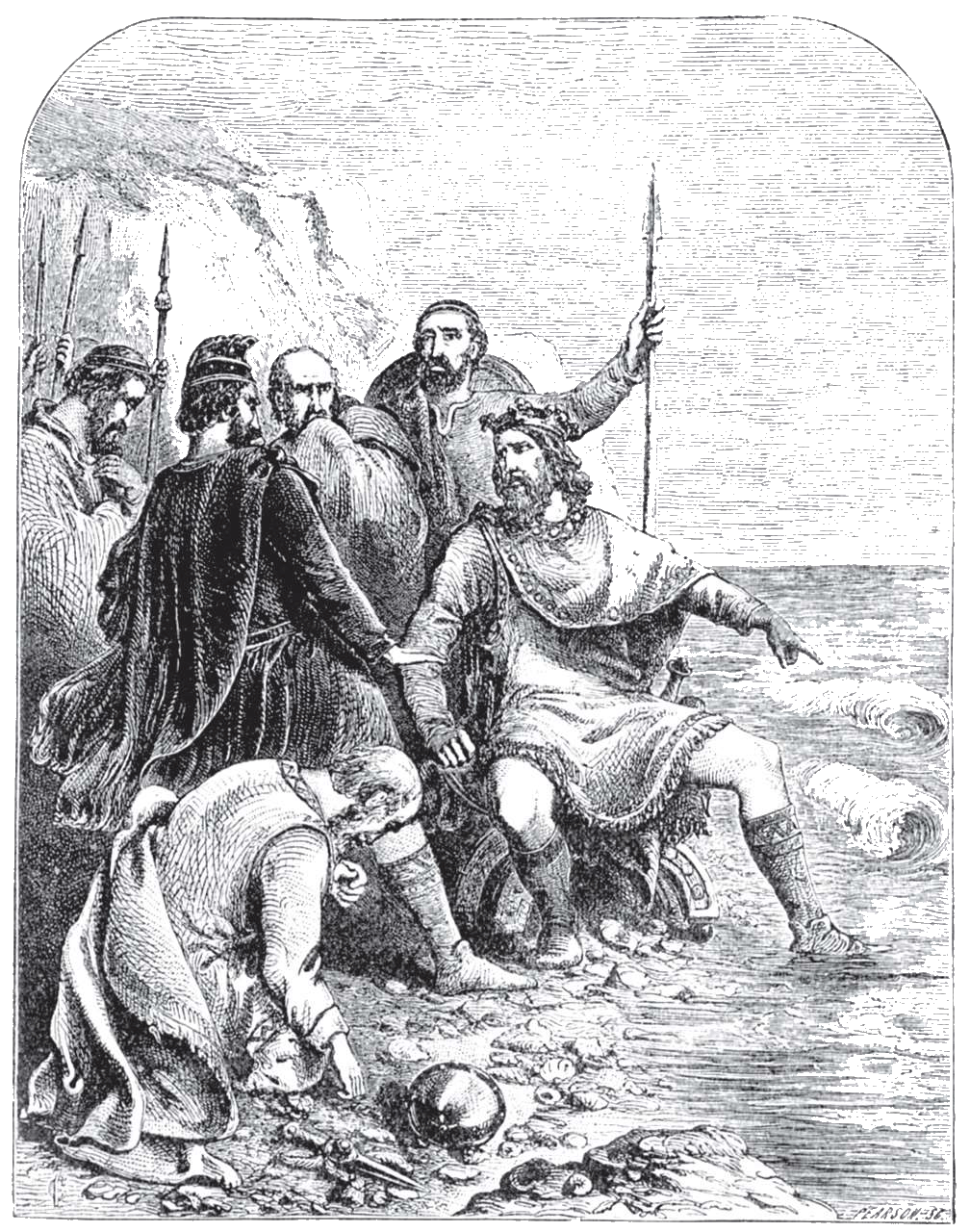





archbishop, chief bishop. misfortune, evil.
considered, thought. mouldering, decaying.
sceptre, a staff borne by kings. relics, remains.
rebuking, reproving; teaching a lesson to. crestfallen, disappointed; cowed.
disgust, offend.
courtiers, persons who attend the court of a king.
1. Of King Canute, or Knut, as he is sometimes called, many stories are told in English history, where he is often called “the Great.” He was certainly the only one of our three Danish Kings worthy to hold a sceptre.
2. An old archbishop, whom the axe of a Danish soldier had struck dead,was buried in the Cathedral of St. Paul in London, and the presence of his mouldering bones within the walls seemed to the citizens a safeguard for their city. It so happened that the monks of Canterbury desired to have the saintly bones removed to their city, and got Canute to allow the removal. He not only consented, but also agreed to help them in the work.
3. When the time came for their removal he was in his bath; but he hurriedly wrapped a cloak about him and ran to the church. The stones of the tomb seemed to drop out of their own accord, and the body was taken from its restingplace. In the meantime, the attention of the Londoners had been drawn off by a pretended riot, and nearly every one had run to see what was the matter.
4. A large boat, adorned with gilded images of dragons, was waiting on the river to carry the remains of the archbishop; and, when all was safe on board, the King steered it across with his own hand. And then a car received the relics, and bore them to Canterbury, where they were received with music and rejoicing.
5. The people of London were very angry at what they considered a robbery, which might bring misfortune on their city; but Canute did not care, for he had done it to please the monks, who were by far the most powerful class of people in Europe at the time.
6. The most famous story about King Canute is that of his rebuking his flatterers. Like many other stories of the olden time, it is now thought to be untrue; but it has a good lesson in itself, and is therefore worth telling here.
7. The courtiers who stood around Canute's throne were in the habit of flattering him to his face, in a way which could not but disgust a sensible man.Living at one time by the sea, perhaps near Southampton, he was told by some of them that they fi rmly believed him to possess power over the waves, which,they said, would roll back at his command!

CANUTE AND HIS COURTIERS.
8. He resolved to rebuke them by putting their foolish words to the test. Accordingly he had a chair carried out to the sea-shore, and placed within the tide-mark, when the waters were flowing in.Sitting there, he called aloud to the sweeping sea, and commanded it to go back. It still flowed on, nearing his chair, as wave followed wave. Again he called; yet still it advanced. At last a wave wet his feet; the next wet his legs; and before many minutes the sea was tossing around his chair.
9. He then turned to the crestfallen courtiers, and said words like these: “None but Almighty God can say to the waves of the sea, ‘Thus far shall ye come, but no further.' The power of an earthly King is vain compared with His.” And then, we are told, he took the crown from his head and sent it to Winchester, that it might be placed, in memory of this lesson, above the crown of thorns on the image of the Saviour.
中文阅读
1. 关于卡努特国王,有时也叫做克努特国王,他的故事在英国历史上常常被人提及,而且人们都称他为“大帝”。在仅有的三位丹麦国王中,他是名副其实的一代英主。
2. 当时有一位年长的大主教死在了丹麦士兵的刀斧之下,遗骨被埋葬在伦敦的圣保罗大教堂。当地的人们都认为砖墙中的圣者遗骨对世人是一种无形的佑护,故而坎特伯雷的僧众希望将此圣迹移至他们的城市,于是向卡努特申请移灵。卡努特国王一口答应,还同意为此项工作提供帮助。
3. 他们着手搬迁的时候,卡努特正在浴室沐浴。听到消息,他立即胡乱裹了一件外衣,一口气跑到了教堂。墓穴周围的砖石已被移开,墓主人的遗体也已经被从棺椁移出。当时的伦敦城几乎万人空巷,人们全都跑到教堂看热闹来了。
4. 城中的河面上停着一艘大船,船身装饰着精美的金龙图案,这便是运送主教灵骨的船只。当一切就绪后,卡努特国王亲自摇桨,开动了大船。灵柩中安放着圣者的遗骨,正被运往坎特伯雷。那里早已一片欢腾,圣乐高奏,欢迎他们的到来。
5. 伦敦的人们对此却非常生气,他们认为这等于是一场抢劫,圣者遗骨的离开还可能给他们带来无妄之灾。但卡努特对此毫不关心,因为做这一切,全是为了取悦教士们,因为毕竟他们才是当时整个欧洲大陆上最有影响力的人。
6. 卡努特国王最著名的故事,莫过于他对阿谀奉承者的拒绝了。当然,像所有古老的故事一样,这段轶事如今也被认为不太真实,不过就事件本身而言,依然有很好的教育意义,因此我们还是有必要在此稍加提及。
7. 当时卡努特身边的近臣都习惯于溜须拍马,但这对明智的人而言,不仅不起作用,反而会引起反感。有一次在海边,可能就在南安普顿附近吧,这帮人肉麻地恭维卡努特,说他们坚信他能驾驭海上的滚滚波涛,只要他一声令下,翻滚的海浪就会消失得无影无踪。
8. 为了不让这帮人继续说这么愚蠢至极的傻话,他决定要给他们上一课。于是他搬了把椅子来到沙滩上,把椅子放在潮汐要经过的地方,坐了下去。当海水慢慢涨潮,向他冲来时,他对着大海高声呼喊,命令海水退回去。海水当然继续冲过来,离他的椅子越来越近,而且一浪盖过一浪。然后他又喊了一遍,海水自然照样前进;最后海水打湿了他的双足,又打湿了他的双腿,再后来便开始撼动椅子。
9. 这时他转过身来,对着这帮羞赧惭愧、垂头丧气的近臣说了一段话:“除了全能的我主上帝,谁也不能命令大海的波涛。我主曾对波涛有言‘到此为止,不再前行'。地上的君主永远不可能有上帝这样的力量。”后来我们还知道,他取下了头上的王冠,把它送到了温切斯特,并一直存放在那里,以此纪念这生动的一课,警醒人们在王权的桂冠之上,只有救世主全知全能。